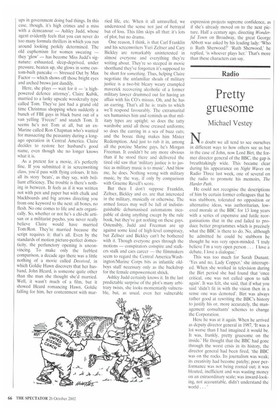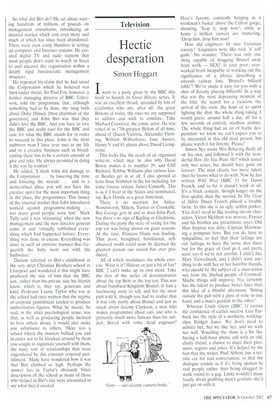N o doubt we all tend to see ourselves in different
ways to how others see us but in the case of John, now Lord Birt, the former director general of the BBC, the gap is breathtakingly wide. This became clear during his appearance on Night Waves on Radio Three last week, one of several on the radio to promote his memoirs, The Harder Path.
He could not recognise the descriptions of him by certain former colleagues that he was stubborn, tolerated no opposition or alternative ideas, was authoritarian, lowered morale at the BBC for 13 long years with a series of expensive and futile reorganisations that in the end failed to produce better programmes which is precisely what the BBC is there to do. No, although he admitted he could be stubborn he thought he was very open-minded. 'I truly believe I'm a very open person . .. I love a debate, I love a dialogue.'
This was too much for Sarah Dunant. 'Yes and no, Lady Copper,' she interrupted. When she worked in television during the Birt period she had found that 'once critical, one was not called upon to talk again'. It was felt, she said, that if what you said 'didn't fit in with the vision then in a sense one was demoted'. Birt was always rather good at rewriting the BBC's history to justify his or, more accurately, the management consultants' schemes to change the Corporation.
Here he was at it again. When he arrived as deputy director general in 1987, 'It was a lot worse than I had imagined it would be. It was, frankly, pretty gruesome on the inside.' He thought that the BBC had gone through the worst crisis in its history, the director general had been fired, 'the BBC was on the rocks. Its journalism was weak; its creativity had become patchy; poor performance was not being rooted out; it was bloated, inefficient and was wasting money on an extraordinary scale; was inward-looking, not accountable, didn't understand the world ... ' So what did Birt do? He set about wasting hundreds of millions of pounds on management consultants, introducing an internal market which cost even more and much of which has since been abandoned. There were even costly blunders in setting up computer and Internet systems. He created digital TV and radio stations that most people don't want to watch or listen to and encased the organisation within a deeply rigid bureaucratic management structure.
He repeated his claim that he had saved the Corporation which he believed was then under threat. Sir Paul Fox, however, a former managing director of BBC Television, told the programme that, although something had to be done, the 'snag both about Duke Hussey 'then chairman of the governors] and John Birt was that they didn't love the BBC. And you have to love the BBC and really care for the BBC and care for what the BBC stands for in order to succeed in this place. John is the most stubborn man I have ever met in my life and in a creative business such as broadcasting there has to be a certain amount of give and take. He always persisted in doing it the way he wanted.'
He added. 'I think John did damage to the Corporation . . . by lowering the tone and lowering the morale .. . and in a demoralised place you will not have the creative spirit for the most important thing in the place, the programmes. This lunacy of the internal market that John introduced worked against programme-making . too many good people were lost.' Mark Tully said it was 'alienating' when the new management and the new director general came in and 'virtually rubbished everything which had happened before. Everything was done in excess. Everything was done in such an extreme manner that frequently the baby went out with the bathwater.'
Dunant referred to Birt's childhood at the very strict Christian Brothers school in Liverpool and wondered if this might have produced the side of him that the BBC saw, rather than the private side his friends know, which is, they say, generous and kind. Professor Laurie Taylor who was at the school had once written that the regime of corporal punishment tended to produce authoritarian figures. What he meant, he said, in the strict psychological sense, was that, as well as producing people inclined to boss others about, it would also make you submissive to others. 'Here was a school where the masters bullied you and in order not to be knocked around by them you sought to ingratiate yourself with them, the nasty sort of relationships that were engendered by this constant corporal punishment.' Many have wondered how it was that Birt climbed so high. Perhaps the answer lies in Taylor's obviously bitter description of the school as many of those who helped in Birt's rise were astonished to see what they'd created.



















































































 Previous page
Previous page